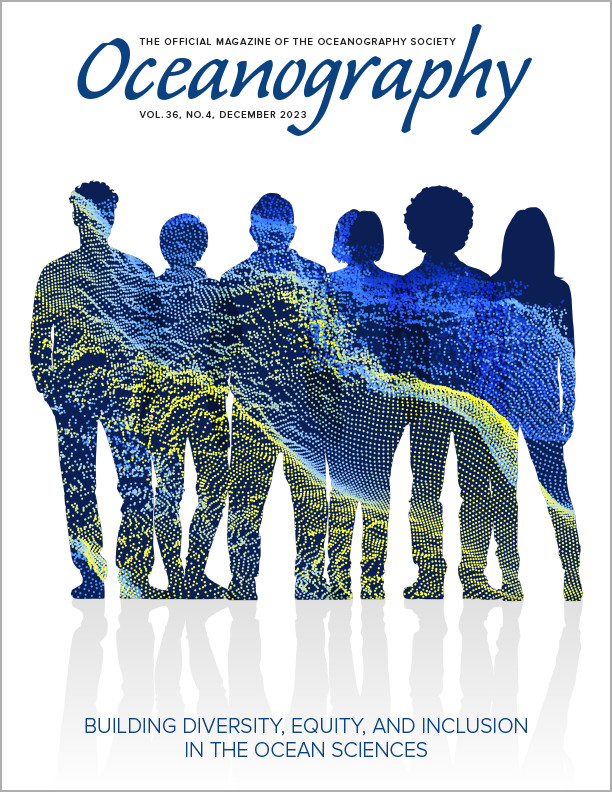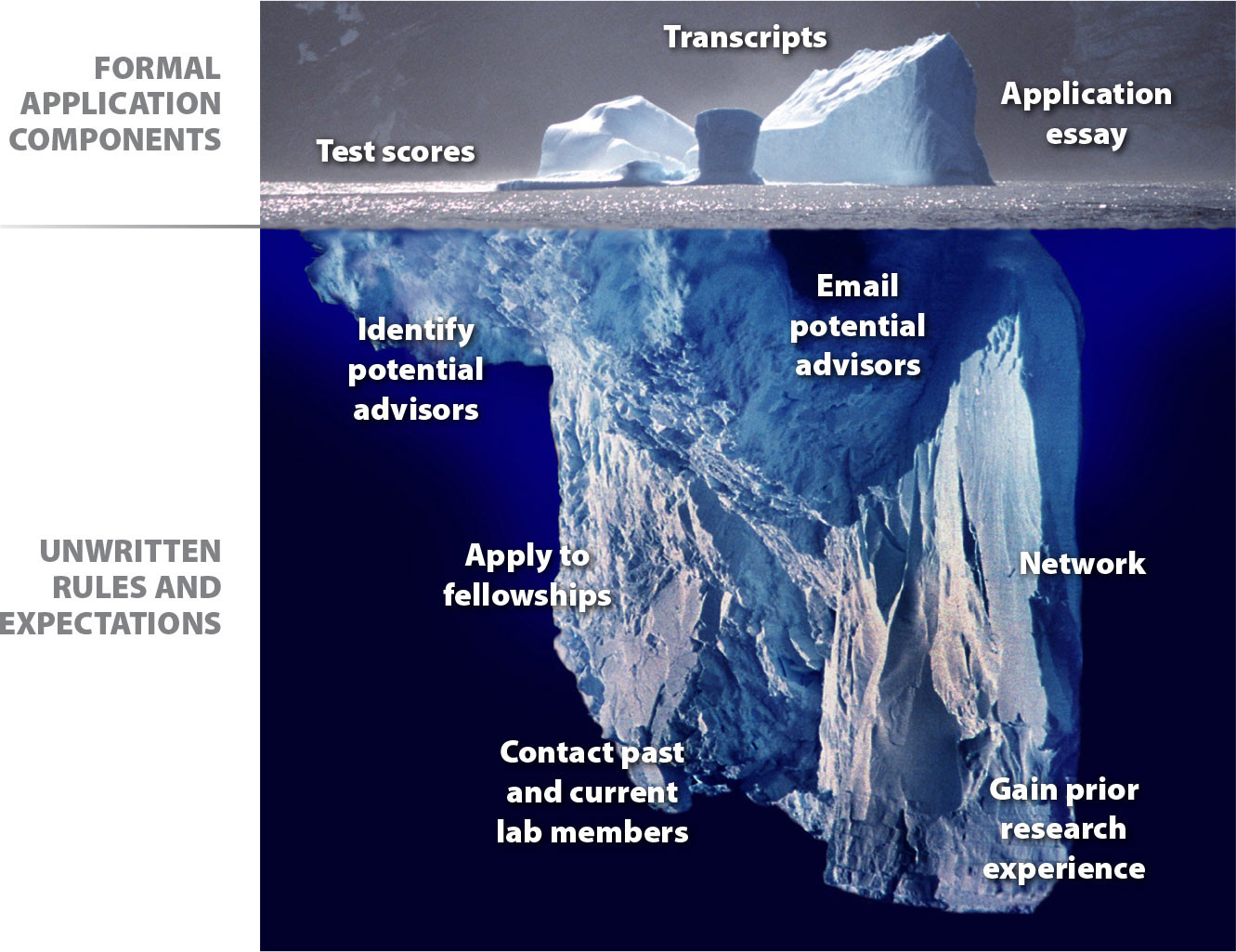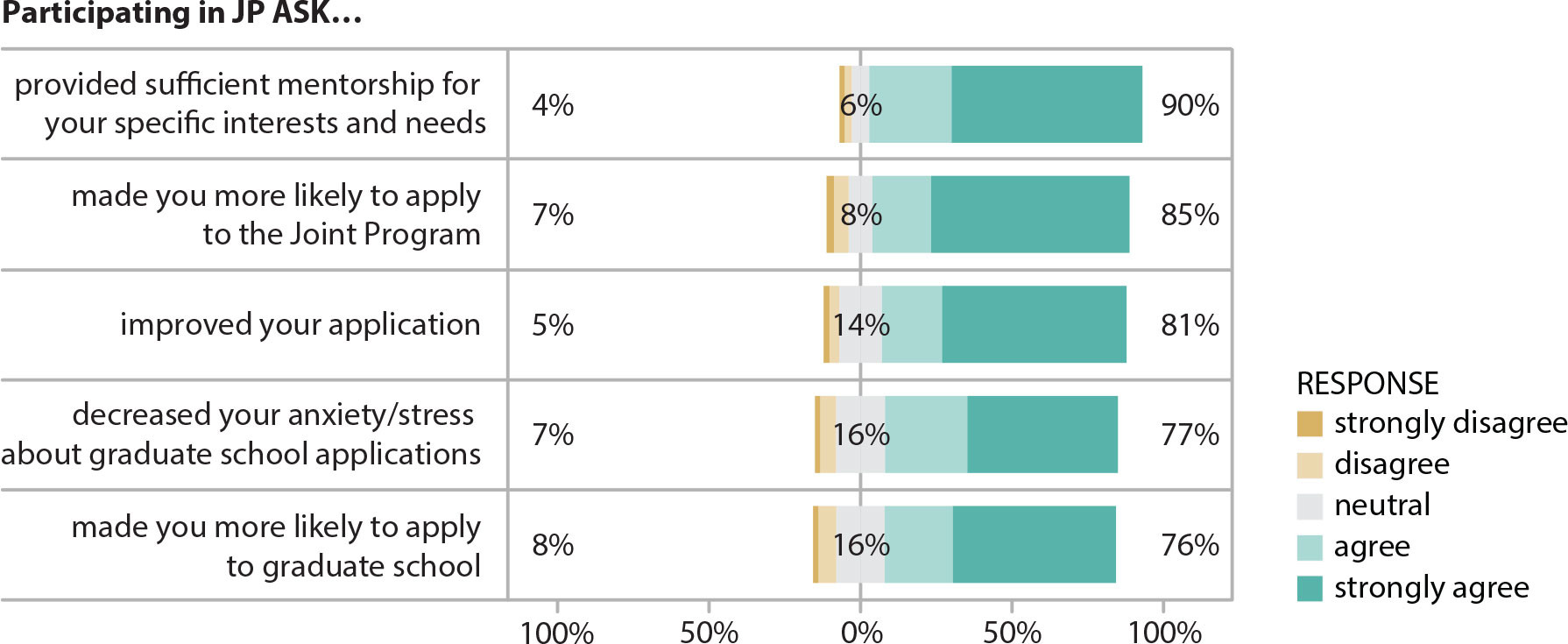Full Text
Ocean science graduate school admissions processes can be confusing, where unwritten expectations and small professional circles advantage those privileged enough to navigate as insiders. Here, we share (1) a model for effective peer-to-peer support, Applicant Support & Knowledgebase (ASK), and (2) insights into challenges faced by under-supported applicants. We aim to generate a discussion about the bias in and inaccessibility of the US-based ocean science graduate school entry process and how peer-to-peer programs like ASK can contribute to a tapestry of solutions that address these inequities.
The story of ASK starts with the shared reflection that many of our peers entered the ocean sciences after discovering the field informally. Opening up about our paths to graduate school revealed the role that heavy-handed privilege and insider knowledge plays in navigating the application process. In Figure 1, the visible requirements at the tip of the iceberg are the essays, transcripts, and test scores that are standard and well communicated to prospective students. The many hidden expectations critical for assembling a competitive application that lie below the surface include: applicants should identify and introduce themselves to potential advisors, find funding sources, and amass an assortment of niche credentials, including research experience, technical skills (e.g., programming, diving, seamanship), and authorship in peer-reviewed publications and conference abstracts (see also Pensky et al., 2021).
|
|
The importance of these unwritten expectations in STEM graduate admissions creates a framework that favors students with greater access to insider information. Yet students of National Science Foundation (NSF)-defined underrepresented racial minority status in US STEM fields and students who are first in their family to attend a four-year university (first-generation students) often lack these resources and networks. In the last 20 years, more than 60% of US doctoral degrees in STEM fields were awarded to students who identified as having at least one parent who held a bachelor’s degree or higher. Concurrently, the relative proportion of first-generation students awarded PhDs has declined (NSF NCSES, 2018). US undergraduates identifying as Black, Hispanic/Latinx, or Indigenous American are more likely to be first-generation students than their White peers (RTI International, 2019). Over time, these social inequities have created a feedback loop that enhances the disparity in STEM graduate school opportunities between students of privileged backgrounds and those lacking such resources.
We, current and past graduate students enrolled in the Massachusetts Institute of Technology - Woods Hole Oceanographic Institution (MIT-WHOI) Joint Program (JP), address this inequity in support and resources during the application process through peer mentoring via JP ASK. Established in 2019, JP ASK provides thoughtful, honest, and empathetic mentoring to graduate school applicants, especially those who may be underrepresented in and/or unfamiliar with MIT, WHOI, or ocean sciences. Critically, our measure of success is mentee engagement and feedback, not admission into our graduate program. Our primary objective is not to increase admissions of certain demographics to our graduate program but rather to overcome inequities in information access by providing resources and peer knowledge to prospective applicants. Participating in JP ASK also helps mentees decide whether our graduate program is right for their personal and career goals. JP ASK is supported by our graduate administration but operates independently of the admissions process such that an applicant’s participation in JP ASK is unknown to the admissions committee and is not factored into admissions outcomes.
Functionally, ASK is run by a small group (five to nine) of graduate students who personalize matches between applicants (mentees) and current graduate students (mentors) during each application cycle. This process is assisted by a series of semi-automated Google forms and Slackbots (code and details available upon request). We ask mentees a series of optional, open-ended questions about their identities, academic backgrounds, research interests, mentorship requests, and any specific concerns about graduate school. With this information, we match them with mentors who provide support, including answering questions, sharing their own experiences, and providing feedback on application materials. Over four application cycles, ~460 mentees from around the world—whose demographics are more diverse than our graduate program and ocean sciences overall—have been successfully matched with ~150 mentors (by year, 40%–50% of the JP student body). Mentee satisfaction is evaluated via an optional exit survey approximately one month after graduate school applications close before acceptances are communicated.
Exit surveys (Figure 2) provide strong evidence that JP ASK meets the specific needs of individual applicants (90%) while attracting more graduate school applications in general (76%) and to our program (85%). In open-ended questions, mentees consistently mentioned how exciting and empowering it was to meet a mentor with overlapping experiences, backgrounds, and/or interests; some said it helped them “get over the hump” of applying to such a prestigious program. Mentors and mentees often first met over Zoom, with many continuing the conversation over email to discuss application materials, introductions to potential advisors, or application fee waivers.
|
|
It is important to note that many nontraditional (those returning to academia after working for an extended period of time), first-generation, and international students shared that this was the only or best resource they had to learn about graduate school and improve their applications. Exit survey results show that these mentees disproportionately appreciated being matched with mentors with similar backgrounds to contextualize graduate school inside of larger hurdles like becoming a student again, delaying the earnings of a full-time job, or moving across the world. In particular, nontraditional students—nearly half of the mentees in the 2022 JP ASK cycle—were the least likely to have access to the resources (e.g., peers, professors, career and professional development offices) to review and improve upon their applications. A key component to the success of JP ASK is the honesty and transparency of our mentors in providing mentees with a realistic view into life as a graduate student; a by-product of an ASK-style program is that mentees may gain an unfiltered view of potential unhealthy advisor behavior or lab culture.
Exit surveys have also identified key knowledge gaps among applicants that highlight ways in which graduate programs might level the playing field. In the 2020 exit survey, mentees who identified as US nationals repeatedly indicated they were not aware of fellowships (23%) or did not have the confidence to apply for them (25%). Since then, JP ASK mentors have more consciously shared fellowship information, resulting in a 10% increase in prospective applicants who applied for fellowships during the 2021 and 2022 cycles compared to 2020. Our next emphasis will be on sharing information with individual departments and affinity organizations, particularly at local and minority serving institutions, in order to provide a better interdisciplinary bridge towards oceanography.
JP ASK is a program for students, by students. In our fourth year, the board is composed entirely of students who first participated as mentors or mentees. We caution that top-down programs to achieve diversity goals can put transactional value on who belongs and why. Our mission is to invest in mentee growth and success on scales that far outweigh where (and if) they may go to graduate school. The success of JP ASK is reflected not only in the positive responses from the mentees in our program but also in the engagement of the graduate student body. Through promoting the JP ASK program here, we encourage student bodies across all ocean sciences programs to actively engage with prospective students through peer mentoring. We also encourage administrators of STEM graduate programs to support student leadership. We invite anyone interested in establishing an ASK-style program to reach out to [email protected].



